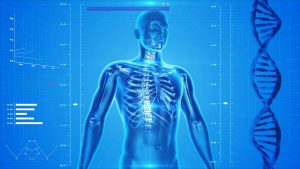
Human bodies are made up of a lot of different parts organized into many different systems. You can see some of these parts. For instance, did you know that the skin is the body’s largest organ? Other systems in your body include the skeletal system, cardiovascular system, and muscular system. All of these systems are very important and work together to keep people healthy.
Integumentary System
Anytime someone looks at their own skin, they are seeing the work of their body’s integumentary system. This body system is more than just skin, though. It also includes your hair, nails, and sweat glands. The integumentary system helps to keep the body’s temperature so it isn’t too hot or cold. It also helps people feel things like heat or a soft blanket.
- What Kids Should Know About Layers of Skin
- Anatomy of the Skin
- Integumentary System
- 15 Questions About Skin
Skeletal System
Without bones, people would look like jellyfish! The 206 bones that make up the skeletal system all have a job to do. Some protect organs (like the rib cage), while others (like arm and legs bones) help people move around. The skeletal system also includes cartilage, ligaments, and tendons, which connect bones together or connect them to other things.
Muscular System
The 600 muscles in the human body that make up the muscular system all work very hard. When you do something as simple as picking up your backpack, you need to use many muscles: The heart pumps blood to keep the muscles healthy, your arm muscles move to pick up the backpack, and your back muscles help to support the weight and keep you stable so you don’t fall over. People can control some of their muscles, but muscles like the heart do their jobs without anyone having to think about it!
Lymphatic System
The body has lots of water and other fluids inside of it. The lymphatic system makes sure the levels of these fluids stay correct. It also keeps infections from spreading through the body. The main work of the lymphatic system is regulating lymph, a clear fluid that contains protein, salt, and other things that the body needs to function.
- The Human Body for Kids: Lymphatic System Song
- Lymphatic System Lesson for Kids
- Lymph System: Cleaning Up the Fluids
- Quiz: Lymphatic System
Respiratory System
The nose, mouth, voice box, throat, windpipe, and lungs are all part of the respiratory system. They bring oxygen into the body and send out the carbon dioxide we don’t need. People have to breathe in oxygen and breathe out carbon dioxide to live.
Digestive System
The digestive system works very hard to break down the food we eat so our bodies can use it. The digestive system pulls nutrients out of the food we eat and gets rid of what’s left over.
Nervous System
The nervous system is made up of the spinal cord, nerves, and brain. Nerves carry messages from the brain that tell other parts of the body what to do. They also carry messages back to the brain so the brain knows when to take action. If you’ve ever touched a hot pan and yanked your hand back right away, without even really thinking about it, that’s because your nerves sent a message to your brain. Your brain automatically made you pull your hand back to protect it from burning. That’s the nervous system at work!
Endocrine System
The endocrine system releases chemicals called hormones that tell parts of the body to do things. Hormones can tell your body to grow or that it’s time to go to bed. One of the most important parts of the endocrine system is the thyroid.
Cardiovascular System
Arteries, capillaries, veins, and the heart all make up the cardiovascular system. The cardiovascular system’s main goal is to bring oxygen and nutrients to tissues and take away waste products.
- Ten Interesting Facts About the Human Heart
- The Heart and Circulatory System
- How Does Your Heart Work?
Urinary System
Humans take in water, vitamins, minerals, and other nutrients from food and drinks. Your body breaks down what you eat and drink and takes what it needs, but then, it has to get rid of the leftover bits the body doesn’t need. The solid waste passes through your digestive system, but the bladder and kidneys, major parts of the urinary system, take care of filtering out things like extra water and salts. The result is urine, which is held in the bladder until you go to the bathroom.
Reproductive System
The reproductive system is how humans are able to make babies. Men and women (and boys and girls!) have different organs in their reproductive systems, and they all play a part in human reproduction.

